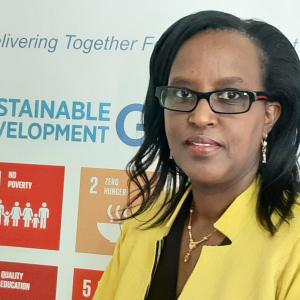Launch of Technology Needs Assessment for Lesotho
Speech by the UN Resident Coordinator a.i
Moderator, Principal Secretary, MCST,
High Level Delegates
Hon. Minister of Agriculture and Food Security; Keketso Sello,
Hon. Minister of Education and Training; 'Mamookho Phiri,
Hon. Minister of Health; Semano Sekatle,
Hon. Minister for MCST; Tšoinyana Rapapa,
Hon. Minister for Trade and INdustry Dr Thabiso Molapo
Prime Minister Dr Moeketsi Marojo
Managing Director (oic) UN Technology Bank, Dr Tafferee Tesfachew
Secretary General Commonwealth
Secretariat; The Rt Hon Patricia Scotland
Distinguished guests,
Firstly, allow me to congratulate the Ministry of Communications, Science and Technology for successfully completing the Technology Needs Assessment (TNA) report through the support of the United Nations Technology Bank for Least Developed Countries. On behalf of the UN system in Lesotho, I would like to affirm the continued commitment of the UN system through the cooperation framework to supporting the Kingdom of Lesotho in its mission to strengthen science, technology and innovation and in achieving the targets set in the 2030 Agenda for Sustainable Development.
Science, technology and innovation (STI) is important, not only for Lesotho but for all countries, even more so for developing countries. For countries to be able to identify critical areas where STI can be more effective to achieve their national development aspirations, the TNA exercise becomes crucial. It helps the countries not only identify their needs, but also reflect on their development progress, and collectively agree on entry points. The unique nature of STI is that it cuts across all sectors, therefore, creating opportunities for enhanced stakeholders’ collaboration.
I am pleased to see that the MCST has convened a stakeholder’s workshop over the past two days to allow further reflection on the TNA findings and collectively agree on projects to implement. The report recommendations also reaffirm the importance of coordination, collaboration, and partnership in general for Lesotho to achieve its development milestones, especially around STI policy implementation.
I also note that access to affordable internet was identified as a cross cutting technological system for the various priority sectors listed in the report as it is an enabler for sustainable development and supports the growth of ICTs and digital economy as a whole.
We are all aware of the high youth unemployment rates in Lesotho, now standing at 34%, we acknowledge that skills development and job creation are crucial, and science, technology and innovation initiatives will assist in reviving the economy.
Allow me to this this opportunity to highlight some of the ongoing work related to STI through the wider UN system in Lesotho. The UN through the UNDAF supports the government of Lesotho through technical and financial support towards science, technology, and innovation, therefore the work of the UN Technology Bank falls within the UN Cooperation Framework.
Through the Accelerator Labs for example, the UNDP works to find new innovative approaches which will address Lesotho’s development challenges, this means opportunities are provided for young people, not only to seek jobs but to create jobs for themselves and others.
In the agricultural sector, statistics show that 58% of the population is rurally based and depend largely on subsistence agriculture for survival. Technologies to improve agricultural yields is critical to enable the Basotho people to come out of poverty. FAO is supporting farmers acquire and adopt technologies such as technical know-how and access to irrigation, rainwater harvesting, pest control, post-harvest management and cold-chain logistic solutions, as well as climate smart agricultural technologies.
WFP is also using cash transfers distributed through mobile money or vouchers which are redeemable at locally contracted community shops, which has proven to be an effective path to achieving food security in Lesotho. In addition, WFP supports the Lesotho Meteorological Services and the Disaster Management Authority to develop technological tools and modalities that help all Basotho to easily access, timely, and decision-relevant climate information to anticipate and cope with current climate variability and limit the economic and social damage caused by climate change.
WFP is also supporting the Government to set up an integrated geospatial platform that will strengthen territorial planning. This digital platform will allow for informed decision-making and evidence-based planning, which is key to the efficient use of the limited resources available to achieve national development goals.
For the education sector, Covid-19 has taught us that digitalization to support e-learning, and support of multiple learning pathways such as technical and vocational education and training (TVET), are fundamental cornerstones for a resilient education sector. The UN in Lesotho led by UNICEF is working with the Ministry of Education to roll out free and open digital tools to support large scale remote learning including TV and national radio programmes.
With the various ongoing STI related initiatives in the country, I believe Lesotho can utilize technology to move towards sustainable and secure development.
Allow me once again, on behalf of the UN Lesotho to congratulate the Lesotho government for successful completion and launch of the TNA report and look forward to supporting its implementation. I also take this opportunity to call other development actors to join hands with Lesotho Government in implementing the recommendations in the report and also utilize the information when planning STI related interventions.
Thank you for your time.
Speech by








